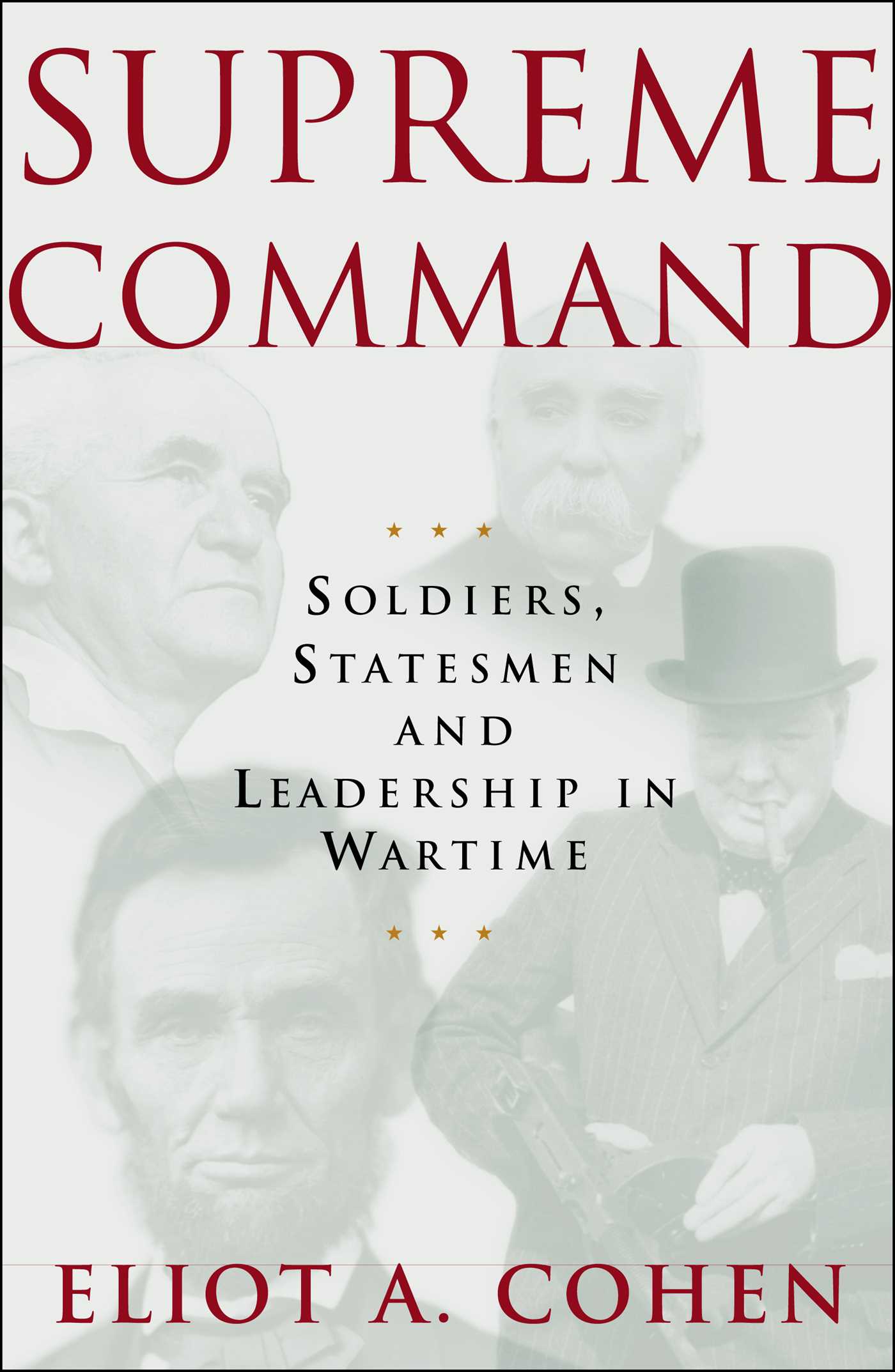Supreme Command Summary
5 min read ⌚
 Soldiers, Statesmen, and Leadership in Wartime
Soldiers, Statesmen, and Leadership in Wartime
A good state leader is not necessarily a good military leader. And vice versa.
Contrary to the “normal” theory, politicians fight and win wars.
How’s that?
Scroll down and figure it out.
Who Should Read “Supreme Command”? And Why?
You still believe that generals and soldiers win wars? How sure are you about that? Read this.
Interested in wars, how they are fought, and how they are won or lost? Give it a go.
Wanting to merely find out something more about the great minds of some of the most powerful leaders, as well as their tactics and politics? Sure, you came to the right place.
About Eliot A. Cohen
 Eliot A. Cohen is a political scientist and a professor at the Paul H. Nitze School of Advanced
Eliot A. Cohen is a political scientist and a professor at the Paul H. Nitze School of Advanced
International Studies at Johns Hopkins University. He used to be a counselor in the United States Department of State.
“Supreme Command Summary”
Is it possible to be both a successful politician or a businessman, and be a great general at the same time?
If your answer is “no” then you are one of those believing that when it comes to war, it is up to the military to take care of it.
However, throughout history, we can find many examples of statesmen who took the matter into their hands because they considered it a political thing. In fact, they weren’t far from the truth.
So, let us introduce you to some of them.
The American One
I believe that there is hardly anyone who hasn’t heard of Abraham Lincoln. One of those “crazy” men who thought that if you are a skillful statesman, you can also be an accomplished general. A belief he proved right.
Even though he lived in a difficult time when new things, such as armaments and ways of transportation, were introduced, he successfully managed to have everything under control. He always knew what he wanted to do and how he wanted to do it.
“Le Tigre”
Known as “The Tiger”, this former journalist got the control of the French army in his hands during the First World War, at the age of 76. And he managed to endure.
According to Georges Clemenceau, the war was a political issue, so that’s why he never left the generals to deal with it. Interested in the real work and problems of his soldiers, and indeed wanting to help them, he was continually giving them visits in the field.
The British Man
This man was unlike the others. Winston Churchill was very precautious and wanted to know even the smallest details of everything. Respected were especially those who freely spoke their minds in front of him, even when they weren’t on the same page.
Although this may be true, he never missed a chance to control his soldiers’ work. He made everyone undergo a challenging test interrogation, and surprisingly or not, not everyone could pass it.
The Zionist
David Ben-Gurion, the statesman of the Promised Land, was the man who made a complete reform in the state’s army. He started a program called “the Seminar” which helped him efficiently detect the problems. After he found out what wasn’t right, he began to build an army this country needed.
He wasn’t afraid to change the current, at the time, military officers. In fact, he knew exactly where to look to find the problems, and that’s what made him prepared for the war with the Arab armies in 1948.
In contrast to these examples, we have Vietnam. Believe it or not, the armed force in Vietnam wеre entirely in the hands of the generals. Although this may sound as a smart decision for those who consider the war as a purely military issue, the outcome shows them the contrary.
As a matter of fact, the first Gulf War is a perfect proof that the war is an exclusively political thing. Despite the efforts of the generals to win this war, without the help of their statesman, they weren’t able to triumph over their opponents.
Key Lessons from “Supreme Command”
1. Your work and dedication are important
2. Don’t be afraid to bump into problems
3. Believe in yourself
Your work and dedication are important
What’s the one thing all these four men have in common? The answer is simple – they worked. They show you how successful you can be if you put some effort to get things done.
They didn’t let others decide on their behalf. That’s how it is in life. In order to succeed you have to do everything yourself, and you can do it, but you need to know or to learn how to.
Don’t be afraid to bump into problems
Usually, we are scared of the problems that can appear while we are working on something important. Hey, life is not perfect, nor are we. The thing is, if there are no problems, nothing can be rightly done.
Do you have a problem? Great! Sit down and find a way to fix it. That’s how it works. And David Ben-Gurion is a perfect example of that.
Believe in yourself
There will always be someone who will tell you that you can’t do something. But it’s your job to prove them wrong. Just like these four men. Many believed it wasn’t their job to take control over the army, or that they just were not right for it because it wasn’t their field of work.
So, what happened? Today they are some of the most famous men in the history of mankind.
Like this summary? We’d Like to invite you to download our free 12 min app, for more amazing summaries and audiobooks.
“Supreme Command” Quotes
The difficulty is that the great war statesman do just those improper things - and, what is more, it is because they do so that they succeed. Share on X Collectively, the new technologies increased the importance of high command at the political center: a single field commander could not now hope to duplicate the feats of a Napoleon or Wellington, much though they indeed aspired to do so. Share on X Clemenceau, perhaps because of his years as a journalist and before that as a clinician, understood the importance of detailed information - the kind acquired not by reading reports but by looking people in the eye, observing the way they… Share on X War statesmanship, in Churchill’s view, focused at the apex of government an array of considerations and calculations that even those one rung down could not fully fathom. Share on X All concerned knew who was master, and if each of these statesmen could offer generous praise none of them would, in the final analysis, relax his grip over his sorely tried subordinates, to the very end. Share on XOur Critical Review
Although “Supreme Command” has a lot to offer, to various types of readers, it feels like something is missing, or something is too much. The parts where Cohen discusses Churchill and Gurion are rather more subjective than offering an objective analysis. Cohen seems to even hero-worship them at times.
Emir is the Head of Marketing at 12min. In his spare time, he loves to meditate and play soccer.


 Soldiers, Statesmen, and Leadership in Wartime
Soldiers, Statesmen, and Leadership in Wartime




